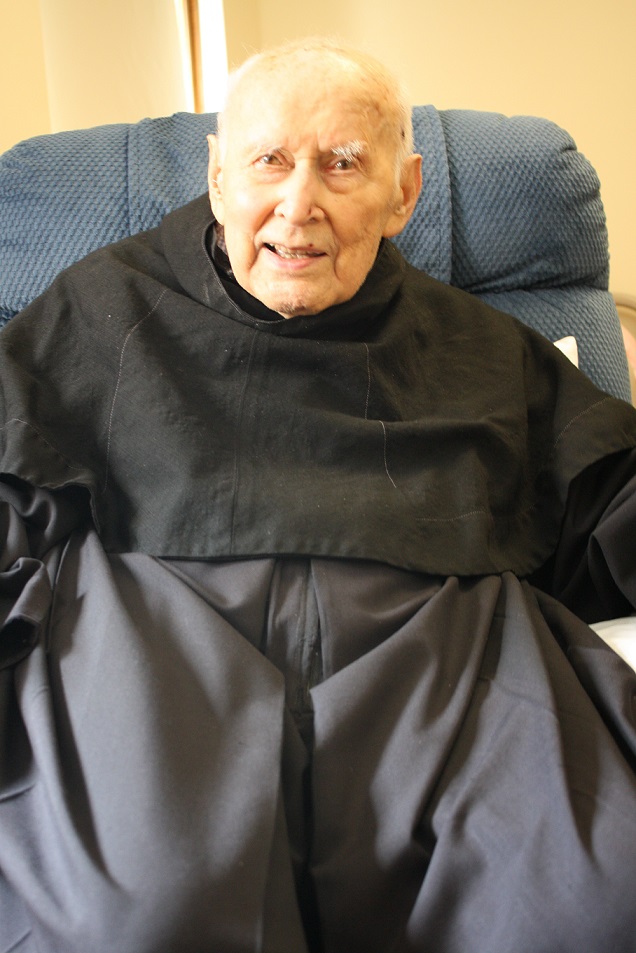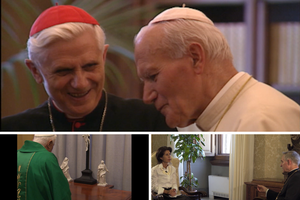Meet the Almost-100-Year-Old Priest Who Knew St. Maximilian Kolbe
Franciscan Father Lucjan Krolikowski also knew St. John Paul II.

Franciscan Father Lucjan Krolikowski’s recollections are sharp and vivid — as the grip of his handshake is strong.
And for a priest who’s about to reach the century mark, equally strong is the joy he radiates in all he does.
When told he doesn’t look like he’s going to be 100, he answers, “I don’t feel like it!” With a lighthearted acceptance in his voice, he adds that his eyes are not good and his ears are not good either. “But I still move around with the walker,” says the nearly-centenarian priest, who lives in Connecticut with other senior friars.
Looking at a 1939 photograph of him with other seminarians posing with St. Maximilian Kolbe, it’s easy to pick him out — he is the one with the big smile. In fact, he still exhibits that ready grin.
On Sept. 7, Father Lucjan turns 100 years old. It will be a momentous day for the Franciscan friar who was born a year after Maximilian Kolbe, whose feast day is Aug. 14, was ordained a priest in 1918 and the year before Pope John Paul II was born. Father Lucjan knew both saints.

St. Maximilian and Me
He studied for the priesthood in Maximilian Kolbe’s seminary in Poland but was sidetracked on his road to ordination when World War II broke out. He was arrested by the Soviets around the time St. Maximilian Kolbe was arrested by the Germans.
“I was three years with him before I was arrested by Communists from the East and sent to a concentration camp in Siberia,” he recalled to the Register as he looked back over some of the highlights of his life during a recent chat.
For three years he studied to become a missionary at the minor seminary located at Niepokalanow, the “City of the Immaculate,” which was Father Kolbe’s monastery — and he was in good company: With 700 friars and 130 seminarians, it was the largest place of formation in the world (and still going strong).
Father Lucjan made his first temporary vows just three days before the war broke out in Poland and 10 days before his 20th birthday. Maximilian Kolbe was present for the sacred occasion.
Then began several years that could comprise an adventure novel. As the Germans attacked Poland from the West and the Soviets invaded the country from the East, young seminarian Lucjan was arrested, given no reason for his detainment, and shipped to a work concentration camp at the foot of the Himalayas.
“When Hitler invaded Russia, Russia was so afraid it released those who could serve in the army,” Father Lucjan recalled. Because his temporary vows had expired (until then he was exempt from military service), Father Lucjan was sent from the camp “to military school for artillery, very close to the Chinese border — far away from the front,” he said. He served in the Polish army. His next move, being sent to Persia and Iraq, proved to be the surprise re-entry into the seminary.
“When we arrived near Bagdad, I applied for seminary, the Franciscan seminary,” he recalled. Priests were needed for the Polish Liberation Army, which was looking for men who already had some of their studies completed.
“I was taken out of the military and sent to Beirut, Lebanon. I stayed four years in Beirut and was educated by the French Jesuits. I was ordained in Beirut” as a Conventual Franciscan friar, he explained.
Maximilian Kolbe’s influence and example remain apparent across the decades.
The future saint “had a love of poverty,” Father Lucjan remembers. “He was humble, very humble. And a good organizer.” One proof: He built Niepokalanow in Poland and then another monastery like it in Japan. As for his humility, he looked like any other friar, in his robe and donning a long beard. Kolbe would also play chess at the seminary. “He was so brilliant he could play several seminarians at once.”
Ordination and Mission
After Father Lucjan’s ordination in 1946 — the same year Karol Wojtyla was ordained a priest — he was named chaplain of a huge military hospital. Quick to follow was “a need for children, youth, in East Africa —Tanzania, Uganda” to have a chaplain, Father Lucjan continued. The children in need were Polish war orphans.
“I was sent there and stayed a couple of years” at the foot of Kilimanjaro, he said. “The Polish Communists had pursued them, had no control over the camps, and insisted that the children be sent to Poland. But we refused. The whole camp refused to have any contact with the Communists because we were arrested by them at the beginning of the war.”
That put him, the two men and one woman helping him, and their nearly 160 orphaned children on the run because the refugee camps were being closed in 1949. “We traveled to Italy,” ending up “near Monte Cassino,” he said of the travels to escape the Communists hot on their heels.
The Polish Communists found them and “demanded the children return to Poland,” he said, “but the children themselves already experienced the breakup of their families. I took the children and left Italy and escaped to Germany; because Polish Communists were very powerful, when we came to Germany, they reappeared and said, ‘Go to Poland.’”
The Communists even had him placed in a hospital in Germany. “They said I had TB and was dangerous for the children,” Father Lucjan explained. “But we had a friend — Archbishop [Joseph] Charbonneau in Montreal. We explained the children are in danger and can be taken by force to Poland.” The archbishop helped, as Canada was willing to accept the children.
“We escaped from Germany to Canada, and we landed in Halifax, Nova Scotia, then went to Montreal.” In one of his books a picture shows Father Lucjan and some of the young, happy-looking orphans standing on the deck of the ship.
Because in Montreal there was no place to keep them all together, he “put them into little groups according to age — 15 years, 16 years, 10 years and so on,” he said. “The French population and hierarchy took care of them. We had benefactors who gave us clothes, a physician who did examinations without cost.” Montreal’s “Cardinal [Paul-Émile] Léger was our protector.”
Pope St. John Paul II
The children had constant reunions. And a visit from Cardinal Karol Wojtyla in 1975 especially cheered the orphans. Father Lucjan well remembers, “Cardinal Wojtyla told the boys and girls, ‘We are ambassadors of Poland.’ He loved our children because he was an orphan, too.”
Father Lucjan saw the Polish saint at others times, as a 1972 photo attests. And in 1978 he met in private audience with then-Pope John Paul II.
Did they speak in Polish? Of course.
With a twinkle in his eye and a big smile, the centenarian friar revealed that John Paul II “told me, ‘We are going to speak Polish in heaven!’”
Father Lucjan is fluent not just in Polish and in English, but also in two other languages. After the children were well settled in Canada, he was named pastor of Our Lady of Czestochowa Church in Montreal. In 1966 he moved to Athol Springs, New York, to work with the Father Justin Rosary Hour, which remains the oldest Catholic radio program in the Polish language.
He would spend 34 years with the Father Justin Rosary Hour, which was broadcast to Poles all over Canada and the United States, including Polish refugees after the war years. Father Lucjan wrote the broadcasts and prepared most of the speeches. Guests included high-profile persons and Church dignitaries such as Cardinal John Krol of Philadelphia (who was the son of Polish immigrants) and, of course, then-Cardinal Wojtyla.
“The radio program was continuous from week to week,” Father Lucjan explained. “When I left (at age 80) there were maybe 10 books printed for the people.” The books contained all the scripts from the radio shows. “People liked to get them. We were very busy, sometimes at night,” he said, then adding with that same jocular expression that often lights up his eyes, “I couldn’t do it today.”
Writing all the scripts, in a sense, he was following in the footsteps of Maximilian Kolbe, who was a powerhouse spreading the faith through the printed word during his time.
“When I was idle I wrote five books,” he said with a chuckle, looking back over the years. Among them were Stolen Childhood: A Saga of Polish War Children and his autobiography, A Franciscan Odyssey: Autobiography of WWII Prisoner, Soldier, Priest and Foster Parent.
Eventually this gentle friar continued his active priestly life at St. Stanislaus Basilica in Chicopee, Massachusetts, where, well into his 90s, he was celebrating Mass, preaching and hearing confessions, including those of the parish schoolchildren.
Past and Future Present
Now, Father Lucjan both looks back at his past century and forward to the upcoming celebration at St. Stanislaus Basilica on Sept. 7 — his 100th birthday.
Father Lucjan continues to concelebrate Mass, and he still keeps in touch with those remaining orphans from so long ago.
He enjoys reminiscing about special memories.
“I love Africa, the jungles, because I was a scout,” he recalled. “The jungle and the animals inspired me. I organized with others, the African men, a safari, and I climbed Mount Kilimanjaro, the highest mountain in Africa.”
When asked how knowing two saints has affected him, he answered animatedly, again with that characteristic twinkle in his eye, “I am obliged! Obliged now to be good like them!”
Does he have any advice to share with Register readers? Quickly and spiritedly, and with emphasis on each word, he counseled, “Smile! Smile to the people. And never give up. And love everybody.”
Joseph Pronechen is a Register staff writer.

















